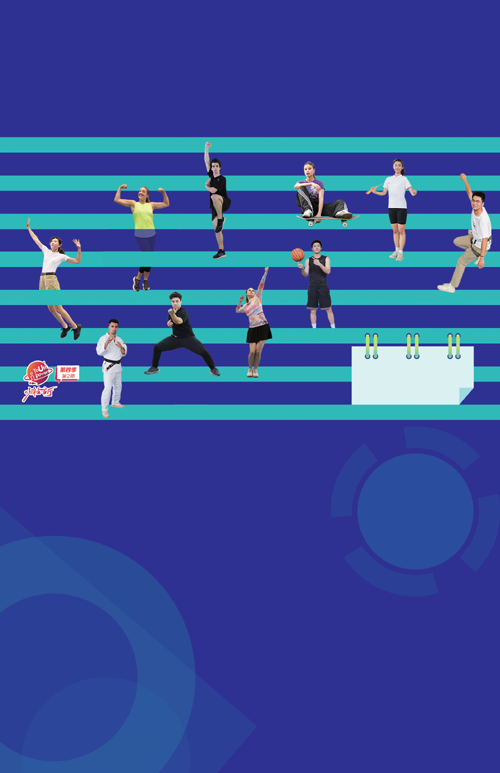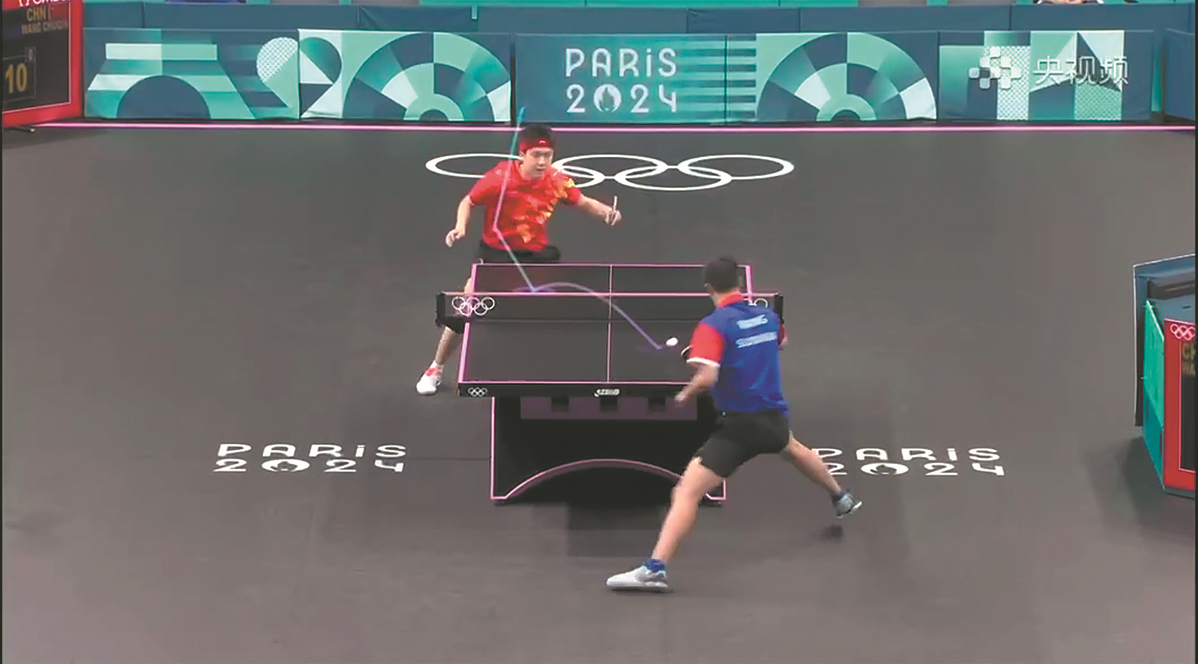A new episode of Youth Power highlights how global Gen Z is experiencing the Paris Olympics' innovations, inclusivity, and unifying power.

While the 2024 Olympic Games are in full swing in Paris, the latest episode of China Daily's Youth Power, which aired on July 30, featured nine young sports fans from around the world exploring the innovations at the Paris Olympics, its commitment to inclusivity, and its power to unite people globally.
Titled "The Fresh Olympic Spirit of Global Gen Z", this episode brought the international visitors to the Chinese Table Tennis College at Shanghai University of Sport (SUS), where they observed a serving robot in action, used in both professional settings and everyday practice.
Lu Yunfei, a teacher at the college, explained that this robot is the world's first to primarily use an arm mechanism for serving, effectively simulating real-world competitive and training scenarios by replicating the spin generated by rubber, a feature that sets it apart from other robots.
According to Lu, the robot was previously used for training with the Chinese national table tennis team. Recently, efforts have been made to introduce it to enthusiasts and players in the broader table tennis community.

"This is a great example of innovation inspired by the Olympics that benefits more people," said Wang Licheng, a 20-year-old Chinese student at Peking University and the host of this episode.
AI technology is also playing a significant role in sports.
At the Paris Games, for example, AI is being utilized in various areas, including combating doping, providing athletes with information and interactive services through the AthleteGPT chatbot, and delivering AI-driven language broadcasting and commentary based on real sports anchors.
ALSO READ: Chinese AI making all the smart moves at Paris Olympics
Anais Carolina Fernandez-Laaksonen, a 19-year-old Finnish student at Tsinghua University with a passion for tennis, highlighted the availability of apps that can be attached to tennis rackets to track metrics and assess strokes for potential issues. She also noted that AI technology helps determine whether shots are in or out in various tournaments.
"So, the sport is fairer. It's left up to the cameras that can see the fine details, rather than humans who make mistakes," she said.

"If you're a judge watching athletes compete all day, it can be very tiring, and you might not have the energy to give a correct score," added Elijah Van Knowles, a 23-year-old US student at SUS who has practiced Chinese kung fu for years.
While acknowledging the benefits of technology in assisting referees with better decisions and reducing their workload, Thomas Mattei, a 28-year-old French graduate from Fudan University, cautioned against completely replacing humans with technology in sports. He emphasized that sports, at their core, revolve around human interaction.
"Technology is kind of denaturing the sport itself and the magic of the effort in the moment, because sport is also about spontaneity and effort being launched," he said.

Susan St. Denis, a 26-year-old US student at Tsinghua University, agreed. She pointed out that while some AI technology can predict team success rates, many instances in sports have shown humans exceeding expectations.
"I think that's the incredible thing with the Olympics," she said.
St. Denis referenced a well-known incident in Olympic speed skating where an Australian athlete, who wasn't expected to win, emerged victorious after falls by other competitors. "AI can't predict that," she said. "I'm sure there might be some controversies around using AI as people try to figure out how to make it as accurate as possible."
ALSO READ: Chinese tech firms shine at Olympics
In addition to technological advancements, the Olympics also serves as a platform for promoting sports and introducing new events.
For example, break dancing made its debut in Paris, while skateboarding and sport climbing, which premiered at the Tokyo Games in 2021, are returning as Olympic sports this year.

"I would say the Olympics is getting more and more diverse," said Stefanie Perner, a 21-year-old German student at Tsinghua University and a passionate skateboarder.
Initially drawn to skateboarding for its appeal, Perner soon realized that every impressive trick was the result of countless attempts and falls. "When you finally land that trick, it's not about how cool it looks anymore," she said.
"To me, skateboarding is a culture. It's a way to express yourself. It's also an art. Showcasing skateboarding at a huge event like the Olympics would help people accept this sport and see the beauty in it."
Knowles expressed his hope for Chinese martial arts to be included as an Olympic event. According to him, the appeal of Chinese kung fu lies not only in its combat techniques but also in its philosophy. One such principle involves the responsible use of strength, as he explained, "I'm strong enough to hurt someone, but I don't use my strength for that purpose."
He believes that Chinese martial arts offer a wealth of benefits as both a cultural tradition and a competitive sport. "It's a pity that not everyone in the world has seen it yet," Knowles said. "If Chinese martial arts become an event in the Olympics, people can experience ancient Chinese culture in a modern setting."

Gender milestone
The Olympics' dedication to inclusivity is also evident in its efforts to promote gender equality. For example, this year's marathon course pays tribute to the Woman's March on Versailles in 1789, a significant moment during the French Revolution. Additionally, male athletes are competing in artistic swimming teams for the first time in Olympic history. Moreover, the Paris Games represent a milestone by featuring an equal number of male and female athletes.
"This resonates with those of us who compete in rowing," said St. Denis, herself a devoted rower.
She noted that it wasn't until 1976 that women were allowed to participate in rowing at the Olympics, marking a long struggle for gender equality in the sport.
Despite the progress, St. Denis stressed that female athletes still lack the deserved attention, facing unequal pay and media coverage compared to their male counterparts.
"So I'm very proud of the Paris Olympics, the fact that they have striven to ensure that women get the same opportunities," she said. "I know just how hardworking we are, and that we can do it just as well, if not better, than men can when it comes to our athletics."
READ MORE: We are proud refugees, also athletes with Olympic dreams, say team flag bearers
Wang believes the essence of the Olympics is captured in the concept of "together". He views the Olympics as a platform that demonstrates how athletes from diverse sports, cultural backgrounds, and nations can unite on a global stage to showcase their talents and personal qualities.
"The Olympics has a philosophy of setting a role model for the world to see how we can work together better and, ultimately, create a shared future for humanity," said Wang.


